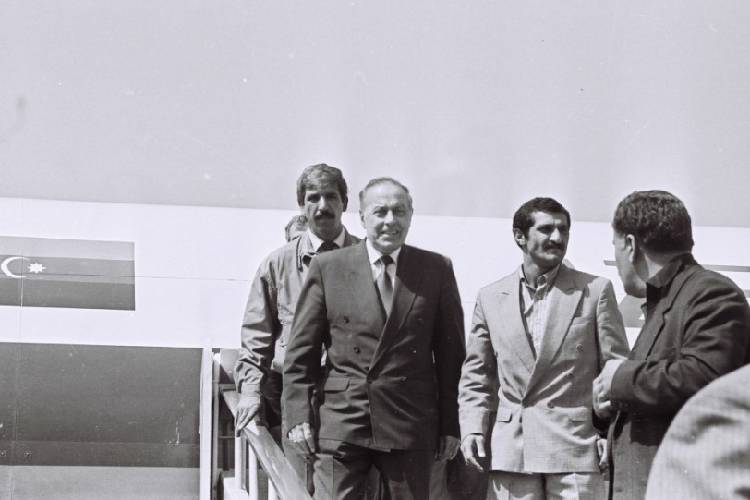Path to Independence: Heydar Aliyev's historic return to Baku
 After the collapse of the USSR, Azerbaijan, having gained independence, was unable to preserve its statehood, as the unprofessional and inexperienced leadership was leading the country into a deep crisis. The situation in Karabakh had worsened, territorial losses had increased, and internal political confrontations, along with conflicts between armed groups, had put the country at risk of disintegration. The people saw their way out only in the return of a leader with political foresight, extensive governance experience, and significant influence — and that leader was none other than Heydar Aliyev.
After the collapse of the USSR, Azerbaijan, having gained independence, was unable to preserve its statehood, as the unprofessional and inexperienced leadership was leading the country into a deep crisis. The situation in Karabakh had worsened, territorial losses had increased, and internal political confrontations, along with conflicts between armed groups, had put the country at risk of disintegration. The people saw their way out only in the return of a leader with political foresight, extensive governance experience, and significant influence — and that leader was none other than Heydar Aliyev.
In the early 1990s, Heydar Aliyev, who led the Supreme Assembly of the Nakhchivan Autonomous Republic, established peace and stability in the region, preserving state traditions that set it apart from other areas of Azerbaijan. His resolute and people-centric policies inspired great hope and confidence across the country. Amid the persistent calls from various segments of society, intellectuals, the military, and the public, Heydar Aliyev arrived in Baku from Nakhchivan on June 9, 1993. His arrival in Baku was seen as the return of a savior in Azerbaijan's history.
The return of Heydar Aliyev marked the beginning of a new era in Azerbaijan's history. In a short period, he succeeded in establishing stability within the framework of the constitution. Armed conflicts were halted, political dialogue was created, and order was restored within the functioning of state institutions. On June 15, 1993, his election as the chairman of the Supreme Soviet of the Azerbaijan Republic by the Milli Majlis restored the legitimacy of state authority in the country. This historic day later became known as National Salvation Day.
Under Heydar Aliyev's leadership, the "Contract of the Century" was signed, and an oil strategy was developed and implemented. The establishment of the military was carried out systematically. A new constitution based on the principles of a legal state was prepared and adopted in a referendum in 1995. Azerbaijan's international relations expanded, and its influence grew regionally and globally.
Heydar Aliyev's return to Baku on June 9, 1993, laid the foundation for Azerbaijan's stability and development in the ensuing decades. Thanks to his visionary policies, Azerbaijan became a leading state in the region by the late 1990s. The direct results of this pivotal return are the restoration of statehood, the preservation of independence, and the formation of unwavering trust between the people and the government.
This event is a bright page in our political history and the most vivid manifestation of the trust and commitment between the people and the leader. The return of Heydar Aliyev, the founder of modern Azerbaijan, to Baku was the people’s choice and the verdict of history.
Recommended literature:
- Mahmudov, Yaqub Mikayıl oğlu. Azərbaycan tarixində Heydər Əliyev şəxsiyyəti / Y. M. Mahmudov ; elmi red. Ə. M. Həsənov. - Bakı : Təhsil, 2002. - 328 s.
- Azərbaycanın qurtuluş tarixi /A. Səmədov ; buraxıl. məsul V. Talıbov ; elmi red. Ə. Həsənov ; red. R. Rzayeva. I cild: Möhtəşəm qayıdış. - Bakı: Ozan, 2004. - 534 s.
- Azərbaycanın qurtuluş tarixi / A. Q. Səmədov ; elmi red. Ə. M. Həsənov. II cild : Azərbaycanda vətəndaş müharibəsi. - Bakı : OSKAR NPM, 2004. – 376 s.
- Гуртулуш / тәрт.: А. Ә. Бабајев, Һ. Бабајев. - Бакы : Милли Мәҹлисин нәшри, 1998. - 462 с.
